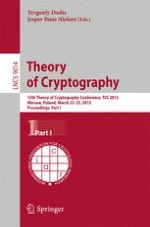2015 | OriginalPaper | Chapter
Leakage-Resilient Non-malleable Codes
Authors : Divesh Aggarwal, Stefan Dziembowski, Tomasz Kazana, Maciej Obremski
Published in: Theory of Cryptography
Publisher: Springer Berlin Heidelberg
Activate our intelligent search to find suitable subject content or patents.
Select sections of text to find matching patents with Artificial Intelligence. powered by
Select sections of text to find additional relevant content using AI-assisted search. powered by
A recent trend in cryptography is to construct cryptosystems that are secure against physical attacks. Such attacks are usually divided into two classes: the
leakage
attacks in which the adversary obtains some information about the internal state of the machine, and the
tampering
attacks where the adversary can modify this state. One of the popular tools used to provide tamper-resistance are the
non-malleable codes
introduced by Dziembowski, Pietrzak and Wichs (ICS 2010). These codes can be defined in several variants, but arguably the most natural of them are the information-theoretically secure codes in the
k-split-state model
(the most desired case being
k
= 2).
Such codes were constucted recently by Aggarwal et al. (STOC 2014). Unfortunately, unlike the earlier, computationally-secure constructions (Liu and Lysyanskaya, CRYPTO 2012) these codes are not known to be resilient to leakage. This is unsatisfactory, since in practice one always aims at providing resilience against
both
leakage and tampering (especially considering tampering without leakage is problematic, since the leakage attacks are usually much easier to perform than the tampering attacks).
In this paper we close this gap by showing a non-malleable code in the 2-split state model that is secure against leaking almost a 1/12-th fraction of the bits from the codeword (in the bounded-leakage model). This is achieved via a generic transformation that takes as input any non-malleable code (
Enc,Dec
) in the 2-split state model, and constructs out of it another non-malleable code (
Enc
’,
Dec
’) in the 2-split state model that is additionally leakage-resilient. The rate of (
Enc
’,
Dec
’) is linear in the rate of (
Enc, Dec
). Our construction requires that
Dec
is
symmetric
, i.e., for all
x
,
y
, it is the case that
Dec
(
x
,
y
) =
Dec
(
y
,
x
), but this property holds for all currently known information-theoretically secure codes in the 2-split state model. In particular, we can apply our transformation to the code of Aggarwal et al., obtaining the first leakage-resilient code secure in the split-state model. Our transformation can be applied to other codes (in particular it can also be applied to a recent code of Aggarwal, Dodis, Kazana and Obremski constructed in the work subsequent to this one).
